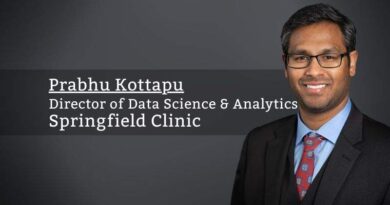Booster Shot: Can AI be the “Shot in the Arm” Healthcare needs to Advance Digital Transformation?
By Bashir Agboola, MBA, MSc., VP/CTO, Hospital for Special Surgery (HSS)
Major technological advancements and crises often herald momentous changes in society that create rapid and lasting impacts. For example, the recent COVID-19 pandemic’s acceleration of digital transformation across industries. In the healthcare industry, the pandemic led to regulatory changes and a quickening of efforts towards digital health, with its attendant potential to address some of healthcare’s long-standing challenges.
However, the frantic rush towards healthcare digitization witnessed during the pandemic has slowed down. For example, telehealth visits dropped sharply after the worst of the pandemic ended; some of the regulatory waivers that paved the way for the adoption of digital health are set to expire unless efforts to make them permanent are successful; shrinking operating margins have reduced investments in digital transformation at some healthcare organizations (half of US healthcare providers operated at loss in 2022). In addition, fears of a global economic recession have led to significant reductions in VC investments in digital health ventures (as part of the overall reduction in venture investments). The healthcare industry is thus in need of a boost to its digital transformation efforts and AI could very well be that “shot in the arm” it needs.
AI has been around for decades and its application in healthcare goes back years. However, the current excitement about its prospect in transforming aspects of care delivery is fueled by advancements in NLP and Generative AI (GAI) brought to public consciousness in late 2022 by OpenAI’s ChatGPT tool. Discussions now abound about AI’s potential to transform approaches to patient care, disease diagnosis, drug discovery, and overall healthcare management.
Developments in AI are evolving rapidly, and additional use cases are coming up daily.
Revisiting the Goal of Healthcare
The fundamental goal of healthcare is to care for people, and that goal is captured succinctly in the Triple Aims of Healthcare framework, which advocates for the “simultaneous pursuit of improving the patient experience of care, improving the health of populations, and reducing the per capita cost of health care”, with a 4th aim added later for “Caring for the wellbeing of healthcare providers”. The potential for AI to advance these four aims is great but significant challenges persist. Let’s explore some of those opportunities and challenges.
Intelligent Healthcare
Prior years’ advances in ML fueled development in precision medicine, predictive analytics, and population health management. Progress continues to be made in these areas as public cloud computing provides healthcare institutions with the technology they need to build and train AI models and process the treasure trove of data that healthcare institutions continue to acquire. A lot of the new healthcare AI use cases being explored today are in the GAI space and practical applications are now viable.
For example, clinician burnout is a well-known problem long before the COVID-19 pandemic and has itself been likened to an epidemic. Healthcare professionals have long complained about being emotionally, physically, and mentally drained. The associated chronic stress negatively affects the providers’ quality of life and decreases their clinical effectiveness, patient satisfaction, as well as leads to a high turnover amongst healthcare professionals. Some estimates suggest that physicians spend two hours on administrative tasks for every hour they spend with patients.
AI is emerging to be one tool in the multi-faceted approach to addressing clinician burnout, and some of the real-world applications of GAI that are actively being trialed can help improve the well-being of providers. For example, clinical documentation is one of clinician’s essential but burdensome tasks. AI can streamline this process by automating data entry tasks, interpreting clinical notes, and extracting relevant information for patient care, thus allowing clinicians to focus more on direct patient care and less on administrative tasks.
Recent advancements on this include Nuance’s Dragon Ambient eXperience, a voice‑enabled AI that unobtrusively records the interaction between physicians and patients and creates the clinical documentation entered into the EHR. Nuance’s technology is powered by GPT4.
Another development is the recently announced partnership between Nuance and Epic to integrate Nuance’s virtual assistance technology into Epic workflows to tackle scheduling, patient vitals and visits within the workflow. There are many more applications of GAI in healthcare expected to hit the market soon.
Challenges of AI Adoption in Healthcare
The challenges that have been discussed for the past several years remain but have become more critical given the rapid AI advancements witnessed in the past year. Long standing concerns around data privacy and security, AI bias and ethics, and lack of regulatory oversight have gotten bigger, with additional concerns such as AI transparency joining the fray. There are strong calls for regulations and hundreds of AI and Tech luminaries earlier this year called for a 6-month moratorium on the development of AI systems larger than GPT4.
Regulation lags behind technological advancement, but some attempts are being made. Earlier this year, NIST released its Artificial Intelligence Risk Management Framework designed to “help organizations better identify, manage, and mitigate AI risks and create more trustworthy AI systems”. Many major tech companies (including Amazon) have supported this framework. In June, the EU parliament approved draft rules for AI regulations. When finalized, these rules would impose strict guardrails around the use of AI.
The barrier to entry into AI is also fast dropping with cloud computing making it easier to train large models. Also, there are open-source projects (e.g., GPT4All) that allow for the deployment of Large Language Models against private data for those with data privacy and security concerns with using public platforms like OpenAI.
Developments in AI are evolving rapidly, and additional use cases are coming up daily. Healthcare leaders are well advised to pay close attention to the opportunities and challenges AI portends for the industry as the future of healthcare will be shaped to some notable degree by developments in this space and disruptions to existing care delivery and business models seem inevitable.



